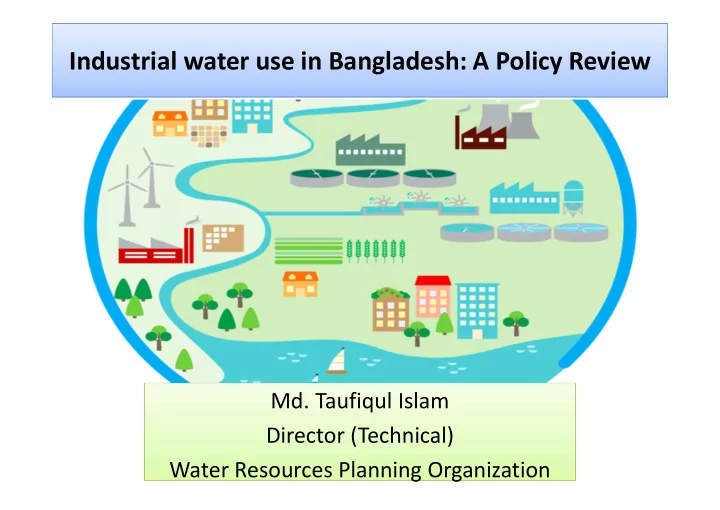

Industrial water use in Bangladesh: A Policy Review Md. Taufiqul Islam Director (Technical) Water Resources Planning Organization Water Resources Planning Organization
Outline… Sl Topic Minutes 1. Defining Industrial Water Use 1 2. Reviewing Policy Landscape 4 3. Emerging Policy Discourses 4 4. Cross –cutting issues 2 5. Approaching Industrial Water Use Policy 3
Industrial Water Use • Industrial water use comprises of water usage • Industrial water use comprises of water usage for - fabricating, - processing, - washing, - diluting, - cooling, - or transporting a product; - incorporating water into a product; - or for sanitation needs within the manufacturing facility. Ref. www.usgs.gov Ref. www.usgs.gov
Relevant Policy Aspects Sources of Directives Zoning regulations for National Bangladesh Water Act, 2013 new industries Water Policy Sec. 23 (1999) Monitoring effluent Natl. Policy for Safe Water Section-4.8 disposal Supply & Sanitation, 1998. Sec. 8.3 -- Standards of effluent -- disposal into common water courses -- Polluters Pay Principle -- Water Pollution Control BWA, 2013 Bangladesh Env. NWP Sec.28 Conservation Act 4.6 Sec. 7 Safe abstraction of BWA, 2013 Agri & Sani. NWP Ground Water Sec. 19 Improvement Act, 4.3 1920. Sec-8.1
Policy Principles / Directives Policy Principles / Directives EA001: Natl. Pollution Control Plan (Natl. 3R Strategy) EA 002: Natl. clean-up existing industrial pollution EA 003: Natl. Water Quality Monitoring ( National Water Management Plan, 2001) SDG Action Plan for Implementation by Ministries / Divisions: - SDG 6.3.1: % of wastewater safely treated - SDG 6.3.2: % of water bodies with good ambient water quality - SDG 6.6: Industrial Water Use Policy is a prerequisite for implementing SDG 6.6 by 2020. - SDG 6.4.1: Water use efficiency = A we × P A + M we × P M + S we ×P S - SDG 12.4, 12.5, 12.6, 12.7 Monetary incentives & penalties : Sec. 4.14 of NWP (1999); Sec. 14 of National Industry Policy (2016) National Industry Policy (2016)
Bangladesh Delta Plan, 2100 Bangladesh Delta Plan, 2100 • Living with Nature • No Regret Measure Interdependent Stand alone Integrated Adaptive Delta Mgt Exogenous Variables Desirable Future All 3 Higher Level Goals Delta Specific Goal 2: Water Security, WUE National Level Strategy Delta Specific Goal 4: Fresh Water Strategy 1.6, 2.1, 2.2, 2.3 Ecosystem preservation Hotspot Level Strategy : 2.6. Urban area: Monitor and control water pollution from industrial effluents
Vision: Water Secured Industrial Development Maintaining Industry’s competitive edge Water availability : Spatial & Temporal Variation Maintaining Water Security Variety of Industries & Supply Chains Industry Involvement & Compliance Monitoring & Enforcement Mechanisms Incentives, Penalties, Market Mechanism Water: No Substitute, No Replacement Water Efficient Growth Water Pollution Control Competing uses – Complicated- Complex
Emerging Policy Discourses Circular Economy Industrial Ecology - Circular Economy - Industrial Symbiosis Industry Platform - Product Stewardship (EU) - Life cycle planning Zero Waste Approach Zero Waste Approach Systems Thinking Systems Thinking -www.zerowin.eu Approach for SDG-6 - BRICS countries call for - Links ‘zero waste’ approach in - Feedback loops water and sanitation - Leverage Points management - WEF Nexus
Cross Cutting Issues Supply Side: Supply Side: - Policy Tools: Acts, Ordinances, Rules, Strategies, Plans, Programs, Projects : National, Regional, Intl. - Valuing Water: Shadow Pricing - Water security & Climate Change related vulnerabilities - Citizen’s participation: Principle of IWRM: Bangladesh Water Rules, 2018 Demand Side: - Regional and Global Dynamics of Industrial process - Harnessing 4 th Industrial Revolution for Water
Approaching Industrial Water Use Policy: From Systems Thinking Perspective
Recommend
More recommend